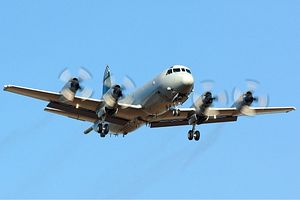On December 14, the BBC ran a story chronicling reporter Rupert Wingfield-Hayes’ attempt to fly near some of China’s artificial islands in a Cessna. The piece is fascinating in its own right – not least for its implication that Wingfield-Hayes was basically conducting his own mini-freedom of navigation operation. When Chinese radio broadcasts warn the aircraft away, Wingfield-Hayes convinces his pilots to ignore the warnings: “We are not breaking any laws, the Chinese are not going to shoot us down. You must hold your course, and you must respond to them and tell them we are a civilian aircraft flying in international airspace.”
But toward the end of the piece is an inadvertent scoop by Wingfield-Hayes. While flying over the South China Sea, his plane’s radio picks up a broadcast from another source:
China Navy, China Navy. We are an Australian aircraft exercising international freedom of navigation rights, in international airspace in accordance with the international civil aviation convention, and the United Nations Convention on the Law of the Sea – over.
Though Wingfield-Hayes says his aircraft was warned away repeatedly (and aggressively) by the Chinese navy, he didn’t catch any Chinese response to the Australian broadcast. Details released later provided a specific date for the radio transmission (November 25) and identified the aircraft as an RAAF AP-3C Orion.
As Wingfield-Hayes explains, Australia has never publicly announced its own freedom of navigation operations in the South China Sea. Yet here was a radio transmission that suggested Australia was doing just that. In response to the highly-publicized U.S. FONOP near Subi Reef in late October, Australia expressed strong support for the rights of freedom of navigation and overflight, but was coy about whether it would conduct its own such operations, either independently or with the United States.
ABC picked up the story from there, including a clip of the audio recording from Wingfield-Hayes. According to ABC, the Australian government still has not announced that it undertook a freedom of navigation operation in the South China Sea. The Department of Defense confirmed some of the details, however, telling ABC that “a Royal Australian Air Force AP-3C Orion was conducting a routine maritime patrol in the region as part of Operation GATEWAY from 25 November to 4 December.”
“Operation Gateway is Australia’s enduring contribution to the preservation of regional security and stability in South East Asia,” according to the Australian Ministry of Defense. It consists of “maritime surveillance patrols in the North Indian Ocean and South China Sea” by the Australian Defense Force. There is no mention of preserving freedom of navigation as a primary purpose; rather, the operation is described as “part of the support to Australia’s efforts to counter people smuggling in the region.”
If Australia did conduct a patrol aimed at establishing freedom of navigation rights in the South China Sea (and, critically, there’s no clarity on exactly where the AP-3C Orion was flying at the time, and whether it entered the 12 nautical mile zone around any Chinese-held features), it did so as quietly as possible. Compare that to the U.S. FONOP of October 27, which was preceded by months of built-up anticipation, based on both public and anonymous comments from U.S. officials.
There’s no question as to which approach China would prefer – which explains its relatively muted response to the reports. Chinese Foreign Ministry spokesperson Hong Lei answered a question on the possible Australian FONOP by emphasizing China’s stance that “there is no problem with navigation and overflight freedom in the South China Sea.”
“We hope other countries, especially those outside the region, will watch their words and actions, rather than bringing up troubles and deliberately complicating the situation in the South China Sea,” Hong continued. As Chinese official critiques go, that’s about as mild as they come. In response to the U.S. FONOP, remember, China accused the United States of having “threatened China’s sovereignty and security interests… and endangered regional peace and stability.”
Meanwhile, the United States itself is apparently not planning to conduct another FONOP near China’s artificial islands in 2015, despite earlier reports to the contrary. Reuters cites U.S. defense officials as saying that the next such operation was likely to come in January.

































